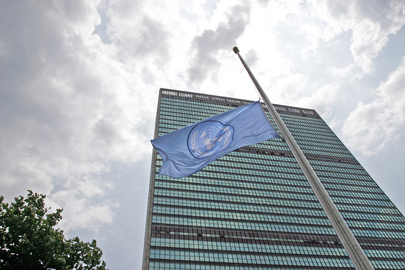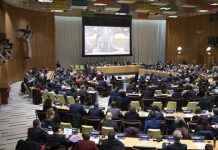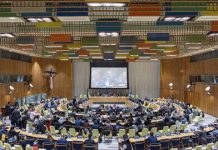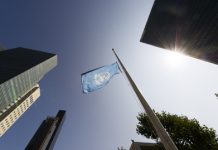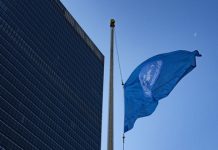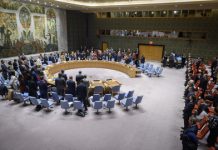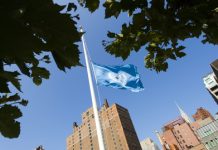First UNRWA staffer killed in occupied West Bank
The UN agency for Palestine refugees has suffered its first fatality in the occupied West Bank, following the death of 220 staffers in Gaza during Israel’s offensive in the wake of the 7 October terror attacks by Hamas and other militants.
Sufyan Jaber Abed was shot and killed on the roof of his home by a sniper in a refugee camp in the northern West Bank, during an overnight operation by Israeli forces early on Thursday, said the agency in a statement.
The UNRWA sanitation worker is survived by his wife and five children.
This marks the first time a staff member has been killed in the West Bank in more than ten years – coming at a time when the territory is suffering unprecedented levels of violence, the agency said.
Services to refugees have had to be suspended because of what UNRWA said was the “unacceptable risk to staff and beneficiaries” posed by Israeli forces during weeks of military operations and counter attacks by militants.
“The use of improvised explosive devices by Palestinian armed actors is of particular concern”, the agency said.
Meanwhile in Gaza, the head of the UN’s World Health Organization, Tedros Adhanom Ghebreyesus, said on Friday that more than 560,000 children under 10 had been successfully vaccinated against polio, during the first round of the emergency campaign there this week.
Over 100,000 children in the still war-ravaged north received shots on the third and final day.
Tedros described it as “a massive success amidst a tragic daily reality of life” for the over two million Gazans caught between Israeli forces and Hamas militants.
WHO approves first mpox vaccine to help ‘timely and increased access’
The World Health Organization (WHO) has given approval to the use of an mpox vaccine for the first time, which it says should facilitate “timely and increased access” for millions at risk in Africa where the latest outbreak has infected more than 20,000 so far this year.
The MVA-BN vaccine from the Danish pharmaceutical company Bavarian Nordic was prequalified by the WHO on Friday, and has already been approved in Europe and the United States, for use by adults.
WHO approval will accelerate access for millions, to reduce transmission and help contain the outbreak.
WHO chief Tedros described it as “an important step in our fight against the disease”, both in Africa and for the future.
“We now need urgent scale up in procurement, donations and rollout to ensure equitable access to vaccines where they are needed most, alongside other public health tools”, he added.
The vaccine can be administered in people over 18 as a two-dose injection given 4 weeks apart.
Prequalification will help accelerate procurement by governments and international agencies such as vaccine alliance Gavi and UN Children’s Fund UNICEF. It can also help fast-track regulatory approval by countries worldwide.
WHO also recommends single-dose use as an emergency provision in the worst hit areas, which is 76 per cent effective.
The two-dose schedule provides an estimated 82 per cent effectiveness.
Nigeria: Hundreds of thousands in need of aid as flooding wipes out homes
Finally, to northeast Nigeria, where UN humanitarians are rushing to assist scores of newly displaced people after torrential rains caused a dam to collapse and flood the area, the UN World Food Programme (WFP) said on Friday.
Alau Dam, just over 10 miles to the south of Maiduguri, the capital of Borno State, collapsed in the middle of the night on Tuesday, forcing hundreds of thousands to flee.
Emmanuel Bigenimana, the head of WFP’s office in Maiduguri, said that he managed to fly over the city with UN humanitarian air service (UNHAS) helicopter, dispatched by WFP to conduct a rapid assessment of damage and needs.
“What I have seen is really heartbreaking,” he said, describing homes, infrastructure, roads, schools, hospitals submerged by water.
He said up to 300,000 people were now living in overcrowded IDP camps or on the streets.
WFP has managed to open soup kitchens to provide hot meals to the affected people and is scaling up its response, together with the authorities and partners.
Mr. Bigenimana said the flood disaster was “an additional burden to already existing crises,” as the region has been facing conflict for a decade.
The impacts of extreme weather are being felt severely across the country. Some 800,000 people in 29 states in Nigeria have been affected by floods as of this month, during 2024, WFP said, and over 550,000 hectares of cropland have been flooded.
Matt Wells, UN News
Music composed and produced by Joachim Harris. All rights reserved
Source of original article: United Nations (news.un.org). Photo credit: UN. The content of this article does not necessarily reflect the views or opinion of Global Diaspora News (www.globaldiasporanews.com).
To submit your press release: (https://www.globaldiasporanews.com/pr).
To advertise on Global Diaspora News: (www.globaldiasporanews.com/ads).
Sign up to Global Diaspora News newsletter (https://www.globaldiasporanews.com/newsletter/) to start receiving updates and opportunities directly in your email inbox for free.


